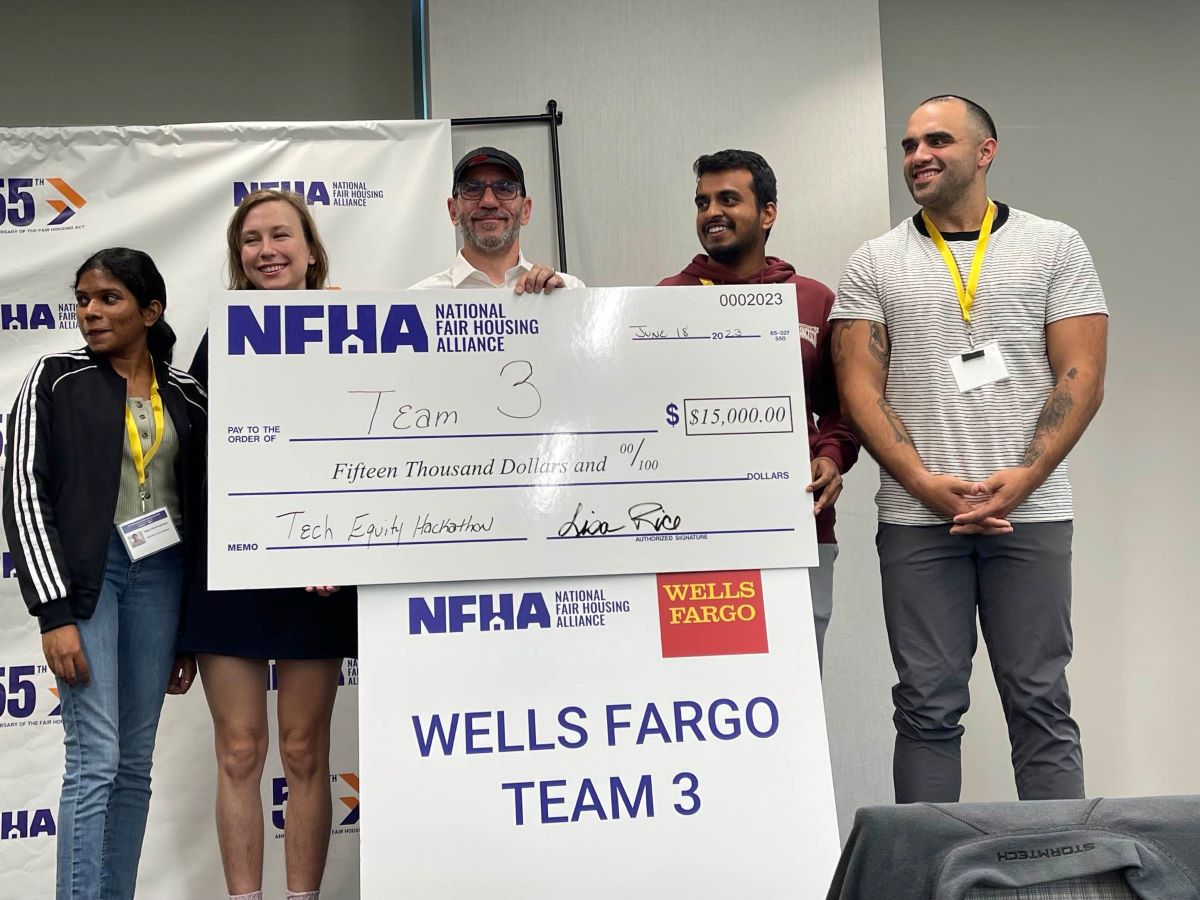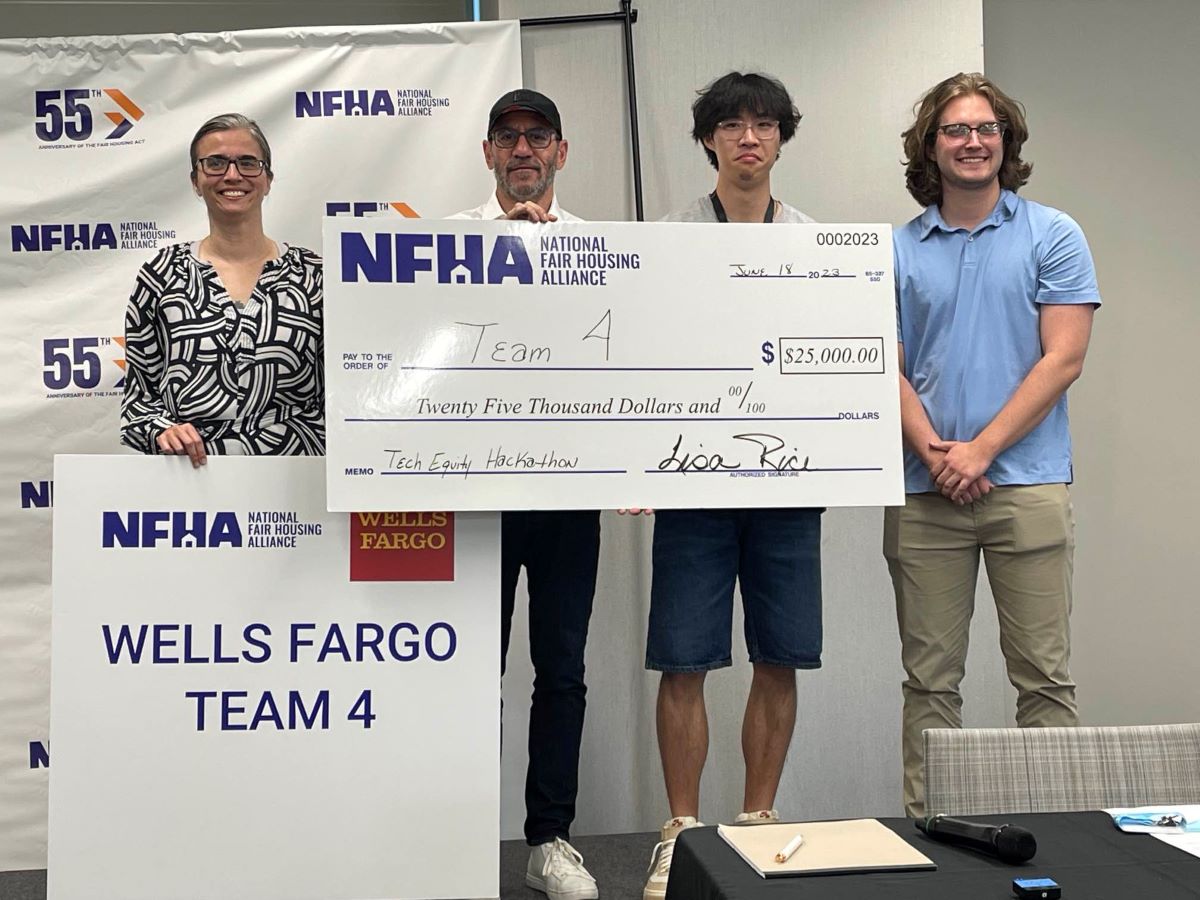With the help of a local hackathon, housing tech might be one step closer to equity for all homeowners and renters.
The National Fair Housing Alliance (NFHA) just hosted its inaugural Tech Equity Hackathon. The three-day event was held at American University, with teams made up of students, recent graduates and other tech professionals — all working in the hopes of building new solutions to end bias in housing and lending. The event was part of a year-long celebration of the 55th anniversary of the Fair Housing Act.
Michael Akinwumi, NFHA’s chief tech equity officer, told Technical.ly that the hackathon was designed to raise awareness about housing inequity, as well as the need to have conversations and develop new solutions.
“When we think about roadblocks to equitable housing, one of the roadblocks is technology,” Akinwumi said. “When I talk about technology, it’s been in the form of AI, machine learning, because we see that more and more financial institutions, insurances, card carriers, use technology to make decisions.”
Akinwumi said that diverse housing seekers are currently hindered by technology in a number of ways, including developing unfair credit scores. Advertisement tech for renters misses those without regular access to broadband, tenant screening records keep renters of color out and mortgage approval technology has a negative impact on home buyers of color, he added.
With that in mind, he said the hackathon focused on models used to evaluate home valuation.
“[The teams tried to] establish if there is a disparity in a typical automated valuation model — and if there is a disparity, there also tried to quantify the size of that disparity,” Akinwumi explained. “We’re focusing on just racial disparity.”
The top two teams were awarded a total of $40,000, and Akinwumi said that some of the learnings and solutions would inform some of the proposals he and his team will be working on this year. John Merrill, cofounder and CTO of FairPlay AI; Dominique Harrison, a previous director at Citi; Emmanuel Ogundimu, a professor of statistics at the University of Durham; and Patrick Murck, president and chief legal officer at Transparent Systems judged the event.

Team three from NFHA’s inaugural hackathon. (Courtesy photo)
Team four, made up of Yoshi Bird, Qilin Tong and Nicholas Bowen, took home first place, winning $25,000. Team three — Brandon Lwowski, Celeste Watkins, Bagya Widanagamage and Sai Chaithanya Vadakattu, was the runner-up, winning $15,000.
The top winners worked on identifying bias in an automated valuation model, Akinwumi said, and won because they were the only team to apply multiple machine learning models to find what was driving bias. They also developed actionable policy recommendations for specific federal agencies, he noted.
“That was the only team where all members had their hands on deck. They worked as a team, not as individuals,” Akinwumi said. “This was reflected during their presentation and in the quality of their submission.”

This editorial article is a part of DEI Progress Month of Technical.ly’s editorial calendar.
Before you go...
Please consider supporting Technical.ly to keep our independent journalism strong. Unlike most business-focused media outlets, we don’t have a paywall. Instead, we count on your personal and organizational support.
3 ways to support our work:- Contribute to the Journalism Fund. Charitable giving ensures our information remains free and accessible for residents to discover workforce programs and entrepreneurship pathways. This includes philanthropic grants and individual tax-deductible donations from readers like you.
- Use our Preferred Partners. Our directory of vetted providers offers high-quality recommendations for services our readers need, and each referral supports our journalism.
- Use our services. If you need entrepreneurs and tech leaders to buy your services, are seeking technologists to hire or want more professionals to know about your ecosystem, Technical.ly has the biggest and most engaged audience in the mid-Atlantic. We help companies tell their stories and answer big questions to meet and serve our community.
Join our growing Slack community
Join 5,000 tech professionals and entrepreneurs in our community Slack today!

The person charged in the UnitedHealthcare CEO shooting had a ton of tech connections

The looming TikTok ban doesn’t strike financial fear into the hearts of creators — it’s community they’re worried about

Where are the country’s most vibrant tech and startup communities?




